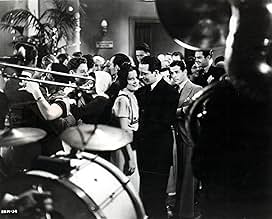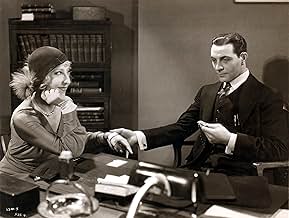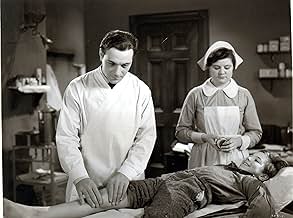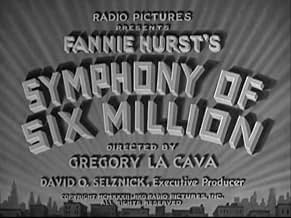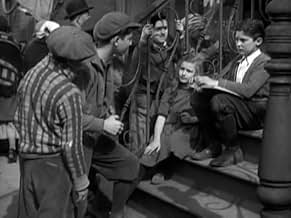AVALIAÇÃO DA IMDb
6,1/10
472
SUA AVALIAÇÃO
Adicionar um enredo no seu idiomaA boy grows up to become a successful doctor at the expense of family relationships.A boy grows up to become a successful doctor at the expense of family relationships.A boy grows up to become a successful doctor at the expense of family relationships.
- Prêmios
- 2 vitórias no total
Maurice Black
- Felix's Patient
- (não creditado)
Jesse De Vorska
- Mr. Horowitz - Hospital Patient
- (não creditado)
Harold Goodwin
- Intern at Hospital
- (não creditado)
Dorothy Gray
- Jessica - as a Girl
- (não creditado)
Julia Griffith
- Guest at Redemption Ceremony
- (não creditado)
Harry Holman
- Mr. Holman - Hospital Patient
- (não creditado)
Avaliação em destaque
A previous viewer commented that there isn't anything "Pre-Code" about "Symphony of Six Million." Ohhhh, yes there is - the frank and loving embrace of Jews and Jewishness, especially the familial bonds of aspiration, hope and love so strong and heart-rending that conflict and guilt are its inevitable by-products.
Such an overtly Jewish photo play wouldn't have been acceptable in the Hollywood of just a few years later. No one would come right out and say so, but the likely reason was the sensibilities of the newly militant Catholic audience, then being stirred up by the likes of Father Charles Coughlin's anti-Semitic radio talks. Also to be catered to were the quieter prejudices of Middle Western Protestants, for whom Will Hays stood in as proxy on the Code committee.
The story being pretty boilerplate, the charm of this film is all in the atmosphere, which is laid on pretty thickly. Crucial to this are able supporting players, especially Gregory Ratoff and Anna Appel as Papa and Mama Klauber. Ricardo Cortez is a bit stiff as the conflicted, noble Felix, but his swarthy, polished earnestness hits just the right note for the well-to-do My-Son-The-Park-Avenue-Doctor, 1932 edition. Irene Dunne as Jessica, Felix's crippled love interest, is lovable mostly for being Irene Dunne, whose refined features and diction don't gibe at all with her role as a ghetto girl. It says a lot about the men who once ran the movies that an obviously Jewish romantic female lead was something they couldn't, or wouldn't, portray. Authentic Jewish womanhood was still inseparable from the family matriarch, played with affecting melodrama by Appel.
TCM's Robert Osborne pointed out that "Symphony" was one of the first talkies with a full original score. At David Selznick's behest, Max Steiner wrote nearly continuous music for the film. It's heavy going at times: Felix's inner drama is too often greeted by heroic heralds of brass, and the lugubrious harmonic-minor strings accompanying Irene Dunne's entrances are like a nice glass Schmalz poured over a sumptuous Sunday chicken dinner.
Such an overtly Jewish photo play wouldn't have been acceptable in the Hollywood of just a few years later. No one would come right out and say so, but the likely reason was the sensibilities of the newly militant Catholic audience, then being stirred up by the likes of Father Charles Coughlin's anti-Semitic radio talks. Also to be catered to were the quieter prejudices of Middle Western Protestants, for whom Will Hays stood in as proxy on the Code committee.
The story being pretty boilerplate, the charm of this film is all in the atmosphere, which is laid on pretty thickly. Crucial to this are able supporting players, especially Gregory Ratoff and Anna Appel as Papa and Mama Klauber. Ricardo Cortez is a bit stiff as the conflicted, noble Felix, but his swarthy, polished earnestness hits just the right note for the well-to-do My-Son-The-Park-Avenue-Doctor, 1932 edition. Irene Dunne as Jessica, Felix's crippled love interest, is lovable mostly for being Irene Dunne, whose refined features and diction don't gibe at all with her role as a ghetto girl. It says a lot about the men who once ran the movies that an obviously Jewish romantic female lead was something they couldn't, or wouldn't, portray. Authentic Jewish womanhood was still inseparable from the family matriarch, played with affecting melodrama by Appel.
TCM's Robert Osborne pointed out that "Symphony" was one of the first talkies with a full original score. At David Selznick's behest, Max Steiner wrote nearly continuous music for the film. It's heavy going at times: Felix's inner drama is too often greeted by heroic heralds of brass, and the lugubrious harmonic-minor strings accompanying Irene Dunne's entrances are like a nice glass Schmalz poured over a sumptuous Sunday chicken dinner.
- paulwl
- 7 de out. de 2006
- Link permanente
Enredo
Você sabia?
- CuriosidadesAfter David O. Selznick became RKO's head of production in late 1931, he put the melodrama A Sinfonia dos Seis Milhões (1932) (originally titled "Night Bell" after the Fannie Hurst story it is based on) into production, overseen by Pandro S. Berman. Selznick insisted that the original screenplay be rewritten to reclaim the ethnic touches from Hurst's story. Selznick likely wanted the film to serve as a mirror on to Jewish life, both of immigrants and their assimilated children. He himself changed the name of the film (a reference to New York City's population) as it was "more dramatic and dignified" than Night Bell. He also directed RKO music department chief Max Steiner to use symphonic music for the score and to have music throughout the picture. This was innovative as "talkies" rarely had an extensive score.
- Erros de gravaçãoAs is often the case when showing a devout Jewish home, a menorah, the traditional candelabrum, is displayed. However, this is used only once a year, so for the rest of the year it is put away. Having it on show is like having a Christmas tree up all year round to show that the family are Christians.
- Citações
Dr. Schifflen: My boy, there are two kinds of men in our profession. Some are gifted with the spark of genius; some of us are... just doctors.
[walks to the door and opens it, then turns back toward Felix]
Dr. Schifflen: Felix Klauber, you're more capable than I, but if you don't go through with this operation, I will.
- ConexõesFeatured in David O. Selznick: 'Your New Producer' (1935)
Principais escolhas
Faça login para avaliar e ver a lista de recomendações personalizadas
Detalhes
- Data de lançamento
- País de origem
- Idiomas
- Também conhecido como
- Sinfonia dos Seis Milhões
- Locações de filme
- Lower East Side, Manhattan, Nova Iorque, Nova Iorque, EUA(opening establishing shots)
- Empresa de produção
- Consulte mais créditos da empresa na IMDbPro
Bilheteria
- Orçamento
- US$ 270.000 (estimativa)
- Tempo de duração1 hora 34 minutos
- Cor
- Proporção
- 1.37 : 1
Contribua para esta página
Sugerir uma alteração ou adicionar conteúdo ausente

Principal brecha
By what name was A Sinfonia dos Seis Milhões (1932) officially released in India in English?
Responda


















